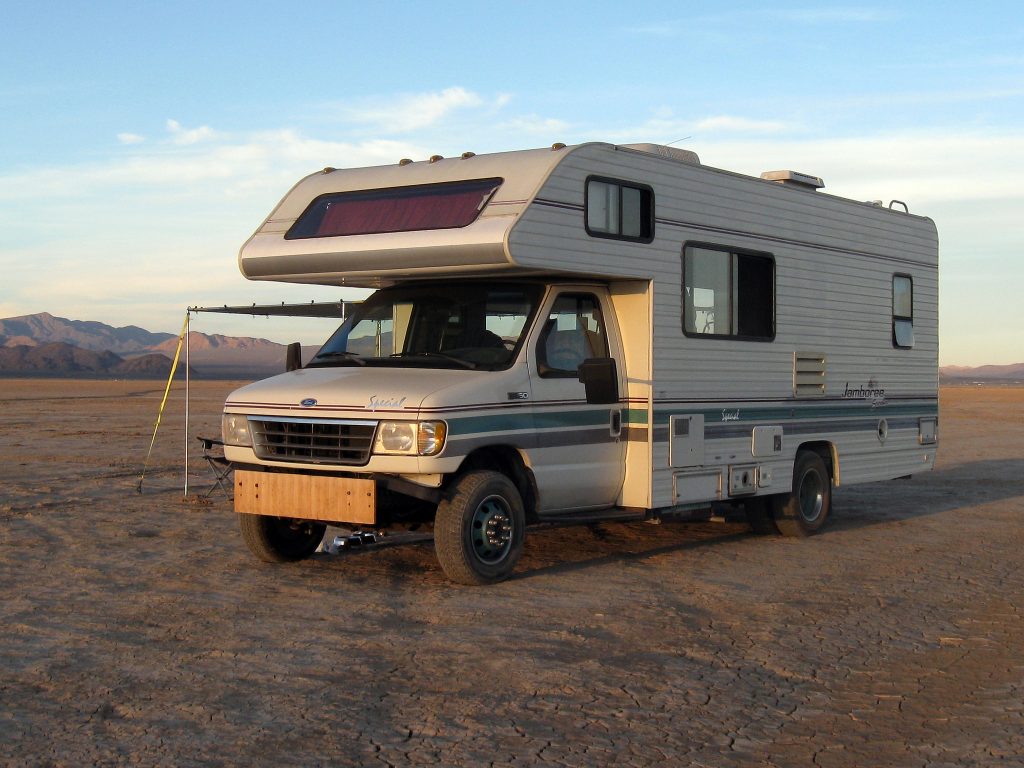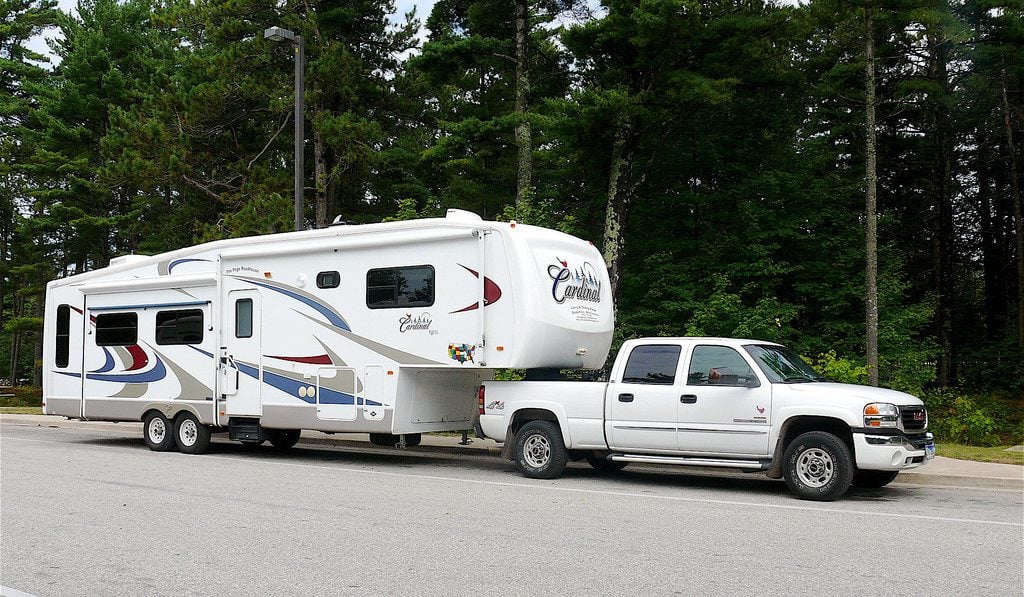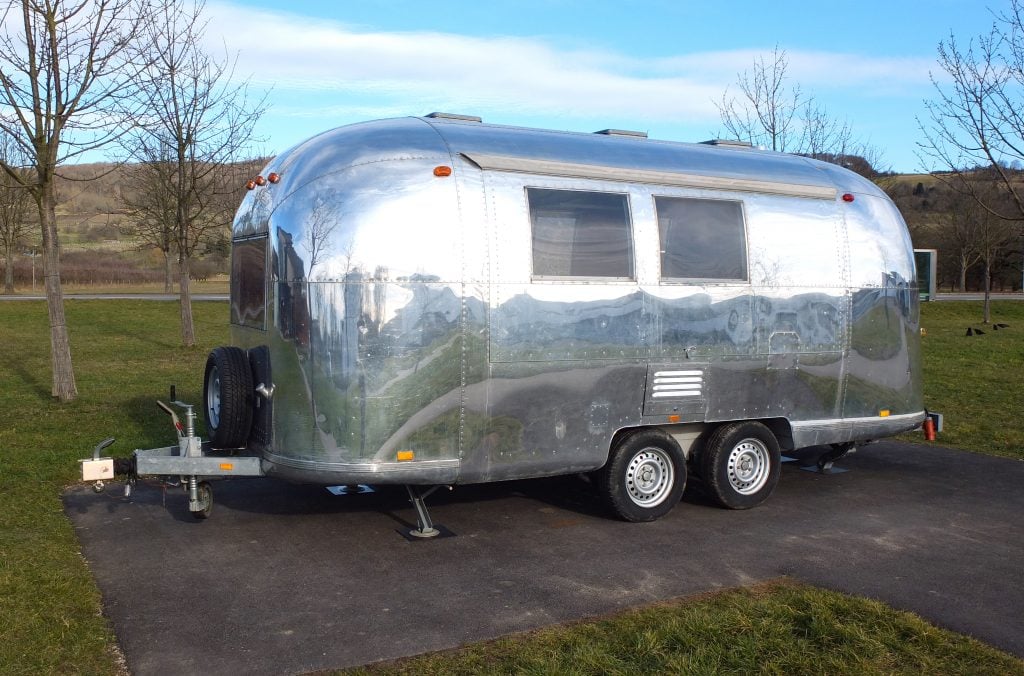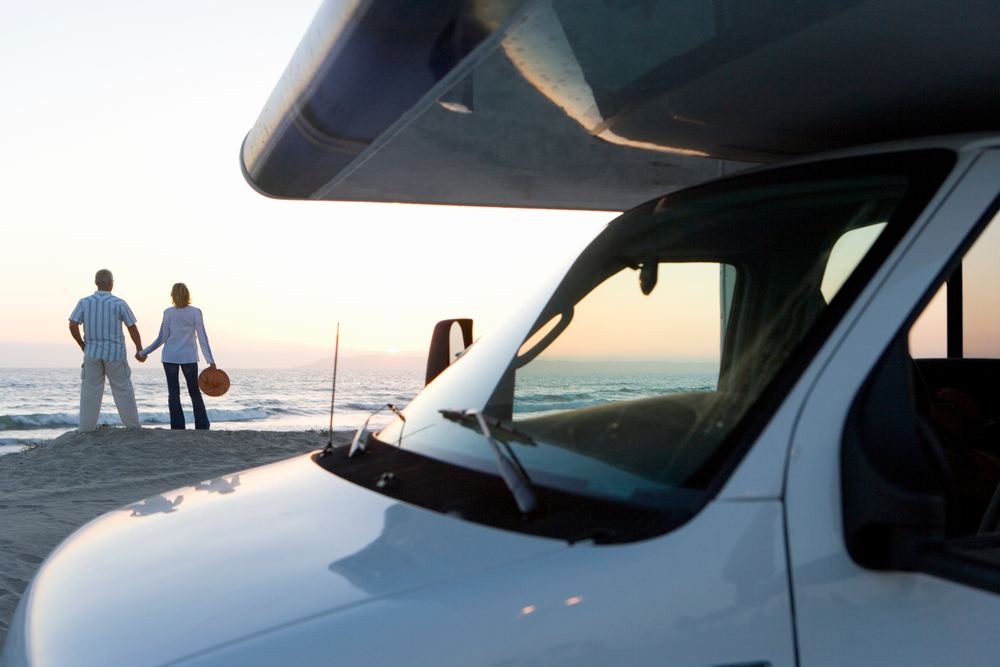Are you considering buying an RV? Maybe you’re new to RV travel, or maybe the vehicle you had before just didn’t work for your lifestyle. Either way, learning more about the different types of RVs that are on the market can give a sense of which one is right for you.
Motorhomes
Motorhomes are some of the most popular RVs out there. They come in three different body styles and offer an array of comfortable camping opportunities.
Class A motorhome:
As the largest and most luxurious type of RV, Class A motorhomes range anywhere from 35 to 45 feet in length. Benefits include a spacious interior and full utilities. There is plenty of storage and room for extra appliances. Both diesel-powered and gasoline-powered motorhomes are available.
On the other hand, the size of a large motorhome can be intimidating. Class As are difficult to maneuver, hazardous to drive, and expensive to operate. Based on the difficulty of running errands, many RVers choose to tow a separate vehicle behind their motorhome.
You should consider buying a Class A motorhome if:
- You often travel with a large family
- You are looking for more storage or space
- You plan on full-timing or RVing often
- You feel comfortable driving a very large vehicle
Class B motorhome:
Also known as camper vans, Class B motorhomes are easy to drive and to park. They can be powered by either diesel or gas and are cheaper to operate than most RVs. Class B’s are also easy to store. They require minimal campsite setup and are convenient for day trips and errands.
However, this convenience does require you to sacrifice some storage and comfort. There is limited space inside since Class B motorhomes are built like vans with raised roofs. Expect to spend a good amount of time outside during the day.
You should consider buying a Class B motorhome if:
- You plan to travel solo or with one companion
- You move from campsite to campsite often
- You have a limited budget
- You don’t feel comfortable driving larger vehicles
Class C motorhome:
Class C motorhomes fall somewhere between a Class A and a Class B. They reach lengths of 20-30 feet, making them slightly easier to park than Class As. Basic facilities are included in the vehicle, and sleeping quarters are more spacious than in a Class B.

Class C RV. Photo: Mitch Barrie/Flickr
Some Class Cs offer pop-outs on the sides or convertible furniture. However, the challenge of driving a Class C motorhome makes it difficult to leave the campsite for a quick trip.
You should consider buying a Class B motorhome if:
- You are looking for more luxuries than a camper van
- You travel often or full-time
- You can’t afford a Class A motorhome
- You desire space and comfort while camping
Detachable units
Trailers and other detachable units are a popular choice among full-timers and part-time campers alike. Their flexibility and versatile designs make them the perfect solution for some RVers.
Travel trailer:
Travel trailers vary in length and connect to several types of tow vehicles with a standard ball hitch. Travel trailers are often fairly roomy and come equipped with facilities, heat, and air conditioning. They also make it possible to detach your tow vehicle and run errands, leaving your trailer at the campsite.
On the other hand, travel trailers can be difficult to level properly and maneuver. Issues like weight and tail sway may come into play, and it can be challenging to reverse when towing a travel trailer.
You should consider buying a travel trailer if:
- You own a large vehicle, like an SUV, that can handle the trailer’s weight capacity
- You often leave your campsite to run errands
- You want spacious and comfortable living quarters
- You want complete protection from the elements
Fifth wheel:
Like travel trailers, fifth wheels connect to a tow vehicle and include plenty of storage. The main difference is that 5th wheels have a gooseneck connection instead of a standard ball hitch. This connection is safer, more reliable, and makes the trailer easier to maneuver.

Photo by Larry Page/Flickr
The overhang also provides extra space in the trailer’s interior. However, a gooseneck connection also limits the type of vehicle that can tow your trailer—a 5th wheel can only be towed by an open-backed pickup truck. This can make traveling with a large family difficult since truck cabs are often very small.
You should consider buying a 5th wheel if:
- You own an open-backed pickup truck
- You want a trailer with enhanced stability and maneuverability
- You are looking for extra storage and a roomy interior
- You plan on traveling with several people, but no more than can fit in your truck
Tent trailer:
With their small, lightweight frames and reasonable costs, tent trailers are a popular choice for part-time campers. They are easy to store when not in use, and give campers a more comfortable alternative to a tent. However, they offer limited storage once collapsed and on the road. Tent trailers provide less protection from the elements and require more time to set up at the campsite.
You should consider buying a tent trailer if:
- You are looking for a more convenient alternative to tent camping
- You plan to travel only occasionally
- You don’t plan to store much in your trailer
- You have limited space to store a trailer
Toy hauler:
Sport utility trailers, or toy haulers, are designed to transport sports vehicles and recreational equipment, but most also feature small living quarters. The size of your toy hauler determines how much space you will have.
These types of trailers can be outfitted with appliances, and their dual functions make them ideal for recreational events or excursions. However, some RVers may feel nervous about camping in close proximity to fuel, oil, and other substances that may exude toxic fumes. Storage of equipment takes first priority in this type of vehicle, so living quarters tend to be cramped.
You should consider buying a toy hauler if:
- You need transportation for your ATVs, bikes, or kayaks
- You are looking for a trailer with facilities and storage
- You participate in outdoor sporting events
- You prioritize storage of gear and sport vehicles over personal comfort
Truck camper:
Truck campers are designed to incorporate the benefits of both trailers and motorhomes. Consisting of a single detachable unit that is transported in the back of a pickup truck, truck campers are easy to store and to detach from your truck at the campsite. They function like small trailers but are easier to transport. Some truck campers have pop-out sides, and many include basic necessities. However, space in a truck camper is minimal compared to many trailers.
You should consider buying a truck camper if:
- You don’t require much space or storage
- You often go on spontaneous, short-term trips
- You want the convenience of a trailer without having to tow one
- You have limited space to store an RV
Teardrop trailer:
Teardrop trailers are a specific style of travel trailer that is smaller and lighter than most. It fits in any campsite and offers protection from the elements. Some teardrop trailers include kitchen facilities that open to the outside.
Most include air conditioning and room for a two-person bed. However, space is very limited in teardrop trailers, and there is usually not enough room to stand. Be prepared for tiny but cozy sleeping quarters with 1-2 windows.
You should consider buying a teardrop trailer if:
- You plan to travel solo or with one companion
- You need extra storage on the road, but not at the campsite
- You are looking for a simple yet effective way to camp
- You camp in many small campsites
Hybrid trailer:
A hybrid trailer is very similar to a travel trailer, but it also encompasses certain elements of a tent trailer. It can be partially collapsed during storage and transport, but its pop-out tent sections provide more interior space than most trailers its size.
Hybrid trailers often include full facilities and can entirely disconnect from their tow vehicles. However, they also take more time to set up and can be more difficult to store than an ordinary tent trailer.
You should consider buying a hybrid trailer if:
- You enjoy the experiences of both tent camping and trailer camping
- You want interior space without having to tow a huge trailer
- You feel confident about setting up your campsite
- You camp occasionally but are not a full-timer
Airstream:
Though a brand, Airstream creates iconic trailers that belong in a category by themselves. Because of their aerodynamic body shape, Airstreams receive better gas mileage. They have unique durability, causing them to last for up to 40 years.

Classic Airstream. Photo via Wikipedia
Kotivalo, CC BY-SA 3.0, via Wikimedia Commons
The low center of gravity found in Airstream trailers makes them more stable and safer to tow. On the other hand, the interior of the trailer is narrower than most, making it hard to move around inside. Airstreams also lack in insulation, making them slightly uncomfortable to live in during extreme weather.
You should consider buying an Airstream trailer if:
- You plan to travel often and invest in it long-term
- You camp in areas with mild weather
- You have a limited budget for gas
- You want added security when towing a trailer
Special-function RVs
Some RVs serve specific purposes. While less versatile than common trailers or motorhomes, they are a good choice for RVers who choose to pursue a specific habit or hobby.
Equestrian RV:
Equestrian motorhomes or horse trailers are essential for those who wish to bring their horses camping. The size of the RVs and their living quarters varies, but they usually house 2-4 horses and up to 3 people.
The horse compartment of an equestrian RV features lightweight stalls to keep your horses safe on the road. The living quarters sometimes come equipped with facilities. However, equestrian RVs can be very difficult to store or to maneuver. They are also fairly expensive.
You should consider buying an equestrian RV if:
- You plan to bring your horses with you
- You don’t want to tow a separate horse trailer behind a regular motorhome
- You can afford a horse trailer or equestrian motorhome
- You aren’t traveling with a large family
Ice fishing trailer:
Ice fishing trailers are one of the most obscure types of RVs. Lightweight and often custom-built from salvaged travel trailers, they are designed to be towed onto solid ice.
With complete facilities, luxuries, and protection from the elements, these unique trailers are some of the best RVs for cold places. Campers can uncover an opening in the floor of each trailer to access holes in the ice. However, ice fishing trailers are rare. They are built specifically for ice fishing and won’t be as durable on other trips.
You should consider buying an ice fishing trailer if:
- You spend the winters up north in icy places
- You take frequent ice fishing trips
- You want the comforts of home in your trailer
- You own a vehicle that is safe to drive in icy areas
Park models:
Park models are an option for those who stay in one place for long periods of time. They include home-like floor plans and luxurious comfort, sometimes connecting to regular city facilities.
Space and storage are plentiful. However, they are very expensive, and not the most mobile form of RV. Boondocking is definitely not an option.
You should consider buying a park model if:
- You are a full-time RVer
- You plan to move to a new location only once or twice a year
- You want the experience of living in a small house, but with some mobility
- You want full facilities and lots of storage
Disability access RV:
Many manufacturers will make RVs with certain specifications on demand. They can modify motorhomes, trailers, and other types of vehicles to meet the client’s needs. Features may include roll-in showers, ramps, and lifts, low kitchen cabinets, or wide doors. These types of modifications allow RVers with disabilities to travel in the comfort of a familiar environment.
You should consider buying a disability access RV if:
- You are confined to a wheelchair or have some other physical disability
- You find that hotels have a difficult time meeting your needs
- You are prevented from using a regular RV
- You require specific features in a living space
By paying attention to your lifestyle and the features of an RV that would suit you best, you can invest in a vehicle that will meet your individual needs and make trips a real breeze.


“and it is almost impossible to reverse when towing a travel trailer.”
Say what, now?
I agree. I’m been doing that for over 20 years.
Class A’s have any floor plans under 35 feet with slide outs for living area and bedrooms. This article seems a bit dated when talking about class C, it is common to find them with slide outs also.
Another factor I never see mentioned is the safety factor of using a standard pickup for towing trailers. Anything else HAS NOT gone thru the crash testing required of standard passenger vehicles, including pickups. This is especially the case for motorhomes. If you look at the shell of a Class B, it is stick-built and will fold like a house of cards in a crash. Pickups, on the other hand, are crash tested, have air bags and protect the occupants in a steel cage.
On Airstream you say, “They have unique durability, causing them to last for up to 40 years.”. Mine is 45 now and has at least another 45 years left in her. On the road folks think it’s a new unit.
Also agree with Lee and would like an explanation on how reversing is near impossible with a travel trailer. Can put mine on a dime no matter the obstructions or direction of turn while reversing, and that’s with non extending sport mirrors on a Ford expedition.
Thank you for your feedback on this article. It’s great to hear that your Airstream is still in such good condition!
I’d like to apologize for my use of the words “nearly impossible” in the earlier version of this post. I understand that was a bit of an exaggeration and I’m sorry if that caused any confusion. I only meant to imply that travel trailers can be challenging to drive in reverse, especially for someone who is new to RVing and trying to weigh the pros and cons of each type of RV. The article has been revised—I hope this clears up any uncertainties you may have had.
This is way way outdated when stating class C’s
I’ve owned 24′ travel trailer 7yrs no slides TV 2002 Chevy Avalanche (still have it)
a 35′ 5th wheel 7yrs TV 2008 Chevy Silverardo 3500 Dully sold it when I sold the 5th wheel and now a 2017 39′ Jayco Super C Seneca 1yr. Class Cs come in gas and diesel much easier to drive than a bus 40-45 class a (have I driven one, no but talked to many RVers and read many MANY articles on forums and Motorhome magazine. They are safer in a crash, because the chassis is on a Semi chassis and the engine is in front. Easier and less expensive to maintain compared to a Class A. No huge windshield like a class A to bake you while you drive to your destination or fly through it in a crash.
Anyway article needs to be updated the picture of the class C is what from the 70’s
One thing not mentioned is the biggest reason I use a truck camper is the ability to go through the back roads in the parks and monuments and see what others miss, and you park almost anywhere a car can.
“Class As are difficult to maneuver, hazardous to drive, and expensive to operate…”
This is ridiculous. Class A motorhomes are no more difficult to maneuver than other similarly sized vehicles (including Class C motorhomes of the same length), and easier to maneuver in most situations than large trailers. There is nothing inherently hazardous about them. They are no more or less expensive to operate than other RVs of similar size and features.
The author apparently thinks that all Class As (and only Class As) are exceptionally large, and that everything large is luxurious and complicated,,, and apparently the author has never driven anything large, or is just not good at it.
My wife and I are considering full timing it. We’re researching the numerous 5th wheels available on the market. We’ve decided to get a Dodge 1 ton diesel pick up for a tow vehicle. My question is, do we buy the truck or 5th wheel first? Our credit is only fair-good so I’m wondering if that makes a difference. We’re newbies so any advice/suggestions are very welcome.
Thanks
Au contrare author. 5th wheels are not normally “gooseneck” mounted on the truck. They come standard with a pin box/pin which slides into a plate mounted on a stand in the bed of the truck. A “gooseneck adapter is an alternate method used by few. A gooseneck adapter is attached to the pin box on the 5th wheel. A ball must be installed in the bed of the truck to receive the gooseneck adapter. Also an open bed without tail gate is not always true. In my case, with a gooseneck adapter I drive with the tailgate installed and up. It must be lowered when landing or mounting the 5th wheel. The biggest advantage in towing a 5th wheel is that it puts the tongue weight of the trailer directly over the rear axle eliminating the fulcrum effect of a bumper mounted trailer. Virtually no trailer sway!
A category not mentioned is an ExpeditionVehicle. Although these can be factory-built for full-time exploration of remote areas, most folks use their experiences with RecreationVehicles to design and engineer their perfect rig based on a commercial chassis.
And another category is Truck Conversions using a MediumDutyTruck to bumper-pull a travel-trailer, or use a stout fifth-wheel hitch to tow a larger fifth-wheel trailer. Some folks prefer the safety of a HeavyDutyTruck for the largest trailers or horse-trailers using a gooseneck hitch described in the article.
After voyagers leave the light-duty pick-up truck classes, the safety and longevity engineered into a commercial chassis justifies the term ‘million-mile’.
And another category is touring on motorcycles or bicycles. I believe author Mark Twain told us travel enrichens and enbiggens the soul. I agree!